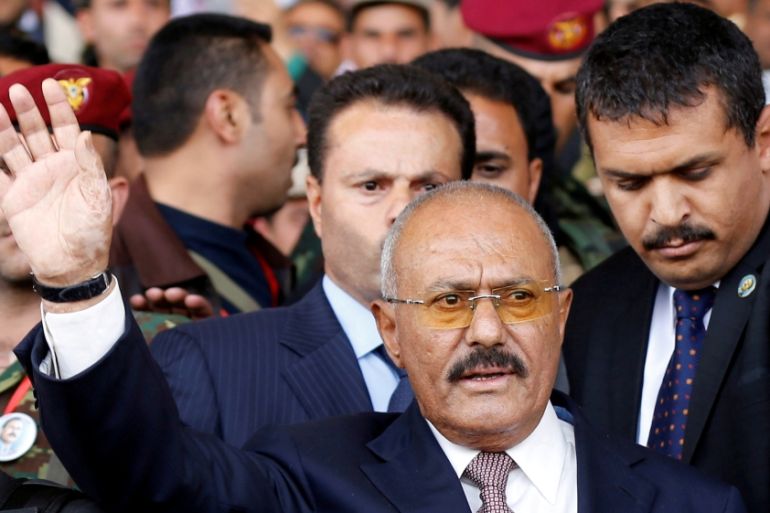Yemen: Houthis meet members of late president’s GPC
Houthi political leader meets late President Saleh’s party in a move suspected to aim at reviving a broken partnership.

A political leader of Yemen’s Houthi rebels has met members of late Ali Abdullah Saleh‘s party, days after the killing of the ousted president by the group that controls the capital, Sanaa.
On Wednesday, Houthi-controlled media on Wednesday showed photos of a meeting between Houthi political chief Saleh al-Sammad and Yahya al-Rai, assistant secretary-general of the General People’s Congress (GPC) and a speaker of parliament.
The meeting in Sanaa was also attended by Hisham Sharaf, the Houthi minister of foreign affairs.
Later in the day, al-Sammad also met other members of Saleh’s GPC, in a move perceived to be a Houthi attempt to restore an alliance with the party.
The Houthis, who protested against Saleh during the country’s 2011 uprisings, formed a shaky alliance with the long-time leader and his party against the government of the internationally recognised President Abd-Rabbu Mansour Hadi in 2014.
This cooperation broke down completely in recent weeks as Houthi fighters and Saleh loyalists clashed.
Two days before he was killed on December 4, Saleh publicly stated his willingness to engage in talks with Saudi Arabia, which has been leading a military coalition against the Iran-aligned Houthis since March 2015.
Last month, Saudi Arabia imposed a total blockade on the impoverished country after a rebel missile was shot down near the kingdom’s capital, Riyadh, exacerbating an already grave humanitarian crisis.
Amid mounting international pressure, Saudi Arabia began to allow some aid to enter the country in the last week of November.
|
|
Despite this easing, the situation in Yemen remains severe, according to the UN.
Splits within the GPC had emerged when Saleh formed an alliance with the Houthis; many party members then shifted their loyalty and support in line with Hadi.
GPC Secretary-General Aref Zouka was killed shortly after Saleh and was buried on Saturday in his hometown.
With Zouka gone, the GPC’s future remains uncertain, with only a handful of leadership figures remaining.
Some, including Yasser al-Awadi are missing.
According to reports, several GPC leaders have been captured by the Houthis and remain in their custody to pressure the party into maintaining an alliance with them.
On Tuesday, a joint statement by the governments of Britain, the United States, Saudi Arabia and the United Arab Emirates urged Houthis to stop targeting political groups in Yemen.
“They expressed outrage at reports of indiscriminate killings and intimidation by the Houthis in Sanaa, including against members of the GPC and their families,” the statement read.
But prominent figures within the GPC, such as Prime Minister Ahmed Obeid bin Daghr and his deputy, Rashad al-Alimi, are expected to take the lead in the near future.
Millions of Yemenis are struggling with hunger and disease, including the worst cholera epidemic on record, which has infected about one million people.
On Monday, a senior UN official called for parties involved in the war to allow “sustained and unimpeded humanitarian access” for Yemenis.
The war in Yemen, now in its third year, has killed thousands and led to one of the world’s worst humanitarian crises. More than eight million people are “a step away” from famine, according to the UN.
|
|